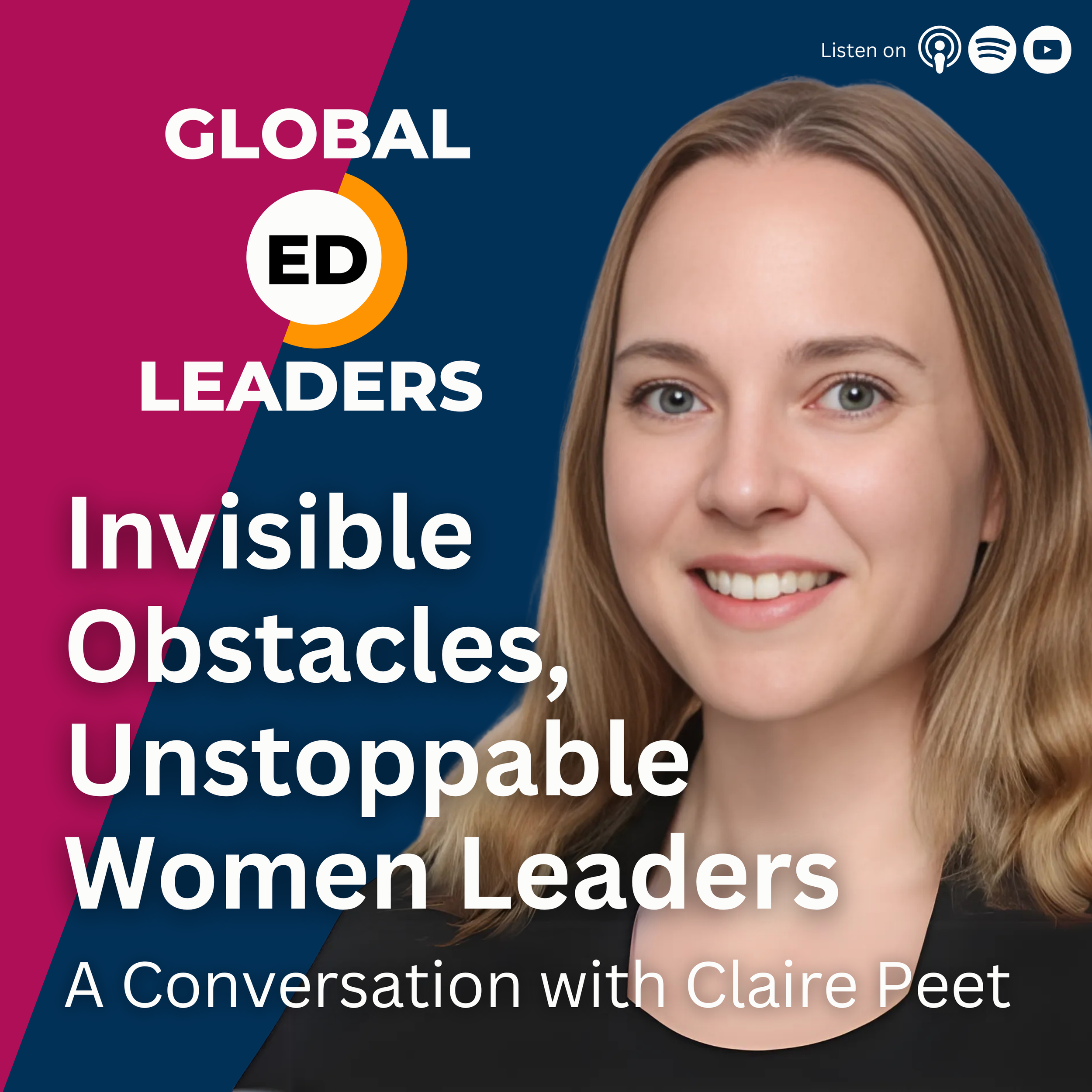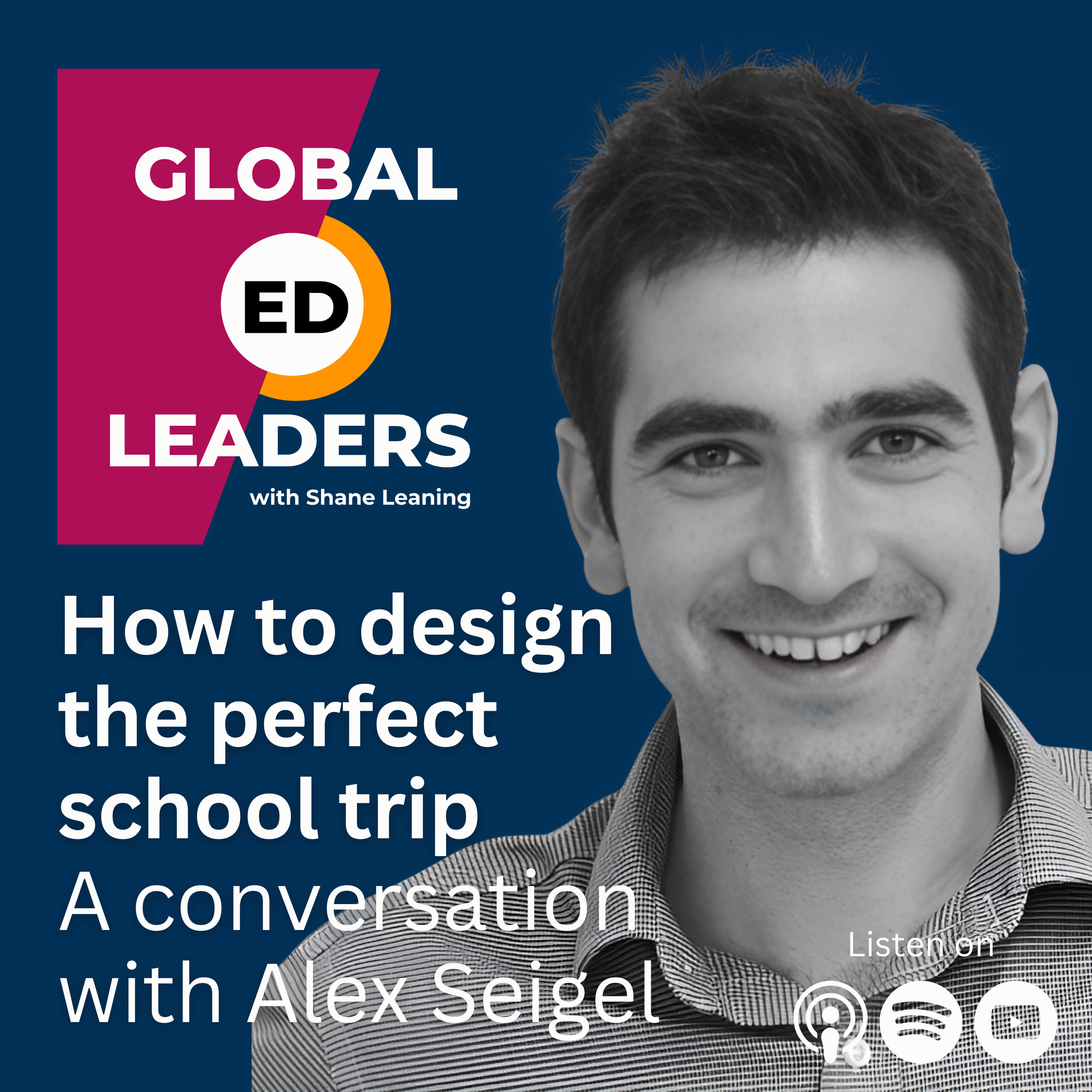Impactful interviews with renowned thought leaders and deep-dives in to international school trends and strategies, to support you in your international school leadership journey.
EDUCATION LEADERS has topped the School Podcast charts in countries across the world* and is in the top 10% of all podcasts globally*.
*#1 podcast in Apple Podcast Charts in Hong Kong, Ireland, April 2024, Top 10% data from ListenNotes
Tune in every week:
Rethinking feedback
Shane welcomes globally renowned educator Ross McGill, known worldwide as Teacher Toolkit. Ross shares his groundbreaking approach to feedback and assessment, challenging traditional marking practices and offering practical alternatives that can transform how schools approach feedback while reducing teacher workload.
The problem with grades
Shane Leaning speaks with Amarbeer Singh Gill and Jennifer Curran from Ambition Institute about assessment in education. The conversation challenges our reliance on grades and numbers, exploring the limitations of traditional assessment methods and offering insights into more meaningful approaches to understanding student learning.
Supporting Men in Schools
Ryan Parke (The Men's Coach) shares his personal experience with the suicide of a friend and explores the complexities of male mental health. He discusses the common belief that men don't talk about their feelings, which he challenges. Ryan and I particularly delve into the role of testosterone in men's health, debunking myths about its effects and emphasising the importance of lifestyle factors such as sleep, diet, exercise, and sobriety in maintaining healthy testosterone levels. He provides practical advice for improving men's health and wellbeing, ultimately advocating for a more nuanced understanding of male mental health issues.
School Vs. Tutor
When some families see tutoring as non-negotiable and others as a last resort, how should international schools approach this complex topic? Sarah Capewell (founder of Aster Academy) and Arthur Moore (Professional Tutor of the Year 2024) unpack the challenges and opportunities around tutoring in international education.
Invisible Obstacles, Unstoppable Women Leaders
In this conversation, Claire Peet discusses the challenges women leaders face in international education. We explore how common leadership terms like 'imposter syndrome' and 'perfectionism' have become problematic labels that can be used against women leaders. Claire shares powerful insights about the double bind women face - being criticised both for adopting and rejecting traditional leadership traits.
LGBTQ+ Inclusion in International Schools
Ian Timbrell and Shane Leaning talk about range of topics related to LGBTQ+ inclusion in schools, including the challenges faced by school leaders, the importance of representation in literature, and strategies for handling difficult conversations. The discussion highlights the need for inclusive practices and the impact of local representation on students' identities and experiences.
How to Develop Wellbeing in your School
Shane and Aimee explore well-being in schools. Aimee shares her passion for well-being and how it started during her early years in school leadership. They discuss the importance of both feeling good and functioning well in order to achieve well-being.
Rethink your literacy strategy
Chris Scorer, an educational consultant and regular speaker on the international education circuit, shares a transformative and deeply personal perspective on literacy. We discuss how overly narrow definitions of literacy and an unyielding drive towards it can have detrimental effects on students, especially those with dyslexia or other literacy difficulties. Chris suggests a radical rethinking of our literacy strategies, advocating for broader frameworks to access and express knowledge that caters to individual learning needs.
7 Principles to Strengthen your Leadership
In this episode, I explore principles that can guide every international school leader. As educators, we are public servants, and it's crucial to reflect on the values that drive our work. Are we truly acting in the best interest of our students?
I break down the Seven Principles of Public Life, also known as the Nolan Principles, and challenge you to consider how they apply within your school setting.
How to design the perfect school trip
I talk with Alex Seigel on how educational trips are a valuable part of a school's curriculum, providing students with transformative experiences and fostering intercultural understanding.
And a great trip includes a balance of key sites and unique experiences, tailored to the interests and educational goals of the students. Adventure leaders and local experts play a crucial role in organising and guiding the trips, providing insights into the destinations and facilitating connections with local communities.
These trips can have a long-lasting impact on students' lives and careers, and it is important for schools to assess and measure this impact. Overall, educational trips offer a powerful way to enhance learning and broaden students' perspectives.
The UK Election and the local/systemic change debate
In this episode, I muse on the recent UK general election and its implications for education. With the Labour Party's victory and Keir Starmer becoming Prime Minister, there’s a palpable sense of hope and excitement among many educators. I discuss my observations from the Festival of Education and reflect on how schools might navigate these changes.
Beyond Consultants and Quick Fixes
In this special episode, host Shane Leaning shares a recording from a session he co-presented with Efraim Lerner at the Festival of Education in the UK. They discuss their new model for driving organisational change in schools from within rather than relying on outside consultants and experts.
Infographics: A Beautiful Distraction?
I take a critical look at the growing popularity of infographics and one-pagers in education. While I acknowledge their aesthetic appeal and potential as conversation starters, as exemplified by the brilliant work of Jamie Clark and the WalkThrus guides, I argue that an overreliance on these simplified visual guides may be holding educators back from deeper understanding and effective implementation.
Should School Leaders Teach?
Are you struggling to decide whether school leaders should also spend time teaching? This episode is for you! I dive deep into the age-old argument of whether school leaders should step into the classroom.
Linguistic oppression in international schools
Dr. José Medina discusses linguistic oppression in education and the need for linguistic liberation. He explains that linguistic oppression occurs when students are not allowed to fully leverage their entire linguistic repertoire, and are instead forced to focus solely on the language of power, which is often English. José emphasises the importance of metalinguistic awareness, which is the ability to make connections between languages in one's repertoire. He also introduces the concept of trans-languaging, which empowers students to use all of their language skills to access content learning. José calls for educators to create linguistically inclusive spaces and to model content language learning targets that incorporate the four plus one language domains.
Should we still be talking about COVID?
Educational psychologist, Dr. Angie Wigford, shares the findings of her survey conducted among students and educators across the Asia on the effects of COVID on international school students and staff. This is a repeat of Episode 6.
Are there too many consultants in education?
Observations on the dual role of educational consultants: providing valuable expertise and perspectives to help schools navigate complex decisions while potentially fostering a dependency that could impede the development of internal knowledge and decision-making capabilities. Drawing from personal experiences and industry insights, I note a trend of short-lived implementations and a cycle of change with each new leadership transition, raising concerns about the sustainability of such practices.
Is Coaching Just Another Fad?
Rachel Lofthouse and I explore the challenges and nuances of coaching and mentoring in education, particularly in the context of international schools. We discuss the potential drawbacks of implementing coaching at scale without proper consideration and support, emphasising the need for a nuanced, teacher-centered approach. The discussion also touches upon the CollectivEd award, which provides a framework for schools to evaluate and enhance their professional learning and development practices. This is part two of our conversation so if you haven’t listened to part 1, go there first.
How to build an Antiracist School
Shane Leaning interviews Orlene Badu, a passionate educator and advocate for equity in education. Orlene shares her personal journey as a young black girl navigating through a system that often underestimated her abilities. Her experiences fueled her determination to ensure that no child is limited by low expectations. Orlene discusses the importance of prioritizing what can be done now and what can be done later, and emphasizes that curriculum alone is not the answer. She calls for schools to have a focused development plan, with racial literacy training for staff, and a deep understanding of the communities they serve. Orlene highlights the need for open conversations about diversity, the challenging but necessary task of addressing biases within the education system, and creating safe spaces for marginalized voices to be heard. This thought-provoking conversation delves into the importance of disrupting systemic inequalities and the power of education to transform lives.
Fidelity vs. Adaptation in Professional Learning
Professor Rob Coe, a leading figure in evidence-based education delves into the complexities and paradoxes surrounding instructional coaching, a topic that has gained significant attention in educational circles. The conversation explores the tension between research and real-world application, between fidelity and adaptation, the importance of time allocation in professional development, and the need for adaptive expertise among teachers and leaders.





















